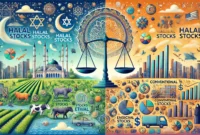As a Muslim, I’ve always looked for ways to make my money match my beliefs and mostly find Halal Stocks.
Halal investing has been a big help. It lets me make money and follow Islamic finance rules.
In this guide, I’ll share the best Halal stocks for ethical growth and spiritual alignment.
Halal investing shines a light in a world where money and morals don’t always mix. It’s a way to make money and do good at the same time.
By choosing Shariah-compliant investments, you can find opportunities that benefit everyone.
What Does Halal Stock Mean?
In Islamic finance, “Halal” means something is allowed by Islamic law, as stated in the Quran.
Halal stocks are shares from companies that follow these rules.
They avoid companies making money from forbidden activities like gambling, alcohol, pork, and interest.
By investing in Halal stocks, Muslim investors and those who care about ethics can make choices that match their beliefs.
They must make sure their investments follow Sharia rules.
To be Sharia-compliant, stocks go through a check to make sure they meet the rules.
This means looking at how a company makes money, its business practices, and what it sells.
Companies that deal in alcohol, pork, gambling, porn, tobacco, or drugs are not allowed for halal investments.
Sharia-compliant stocks must focus on ethical profit-sharing and avoid interest.
They also need to respect ethical values.
Short-selling is not allowed under Sharia law.
Investors in halal stocks should watch their investments closely, as companies can change and lose their compliance.
The Islamic finance market offers more options for halal stocks, attracting both Muslim and non-Muslim ethical investors.
Companies linked to interest should be avoided because riba (interest) is banned in Islamic finance.
Halal investing promotes ethical growth in portfolios, leading to a more thoughtful investment strategy.
As the global Islamic halal economy grows, so will the demand for Sharia-compliant investment solutions.
Read Too : Why Halal Stocks Are the Future of Ethical Investing
Parameters That Determine the Shariah Compliance of a Stock
Investing in Shariah-compliant stocks is a smart choice for those looking for ethical returns. A
stock is Shariah-compliant if it meets certain financial ratios and guidelines.
Let’s look at the main factors that decide if a stock is Shariah compliant.
- Business Activity: The company can’t make more than 5% of its money from non-Halal or doubtful sources. This rule makes sure the company’s main business is right in line with Islamic values.
- Interest-bearing Securities and Assets: AAOIFI says a company can’t have more than 30% of its value in interest-bearing securities and assets. This rule applies to both short-term and long-term assets.
- Interest-bearing Debt: A company’s debt with interest can’t be more than 30% of its total value. This rule helps keep the company’s finances in line with Islamic rules.
These financial ratios and rules are key to seeing if a stock is Shariah compliant.
It’s important to keep an eye on a company’s activities and finances to make sure they stay Halal.
For investors wanting a Shariah-compliant portfolio, tools like Musaffa’s Shariah Stock Screening Platform are helpful.
By following these rules, investors can make choices that match Islamic finance principles and get ethical returns.
Best Halal Stock Screening and Investing Platform
Muslims looking to invest with Islamic values find Musaffa a top choice.
It’s led by Islamic scholars and offers a full platform for shariah-compliant stocks worldwide.
Users can screen, research, and invest with ease.
Musaffa’s Shariah board checks everything to make sure it follows Islamic finance rules.
It sorts stocks into Halal, Not Halal, and Doubtful categories.
Stocks are rated from 1 to 5 for compliance.
This helps investors make choices that match their ethical investment goals.
Musaffa also offers Islamic finance resources for learning.
It teaches the basics of Islamic finance and how to analyze investments.
This helps users understand Shariah-compliant investing better, making them more confident in their financial choices.
Musaffa aims to launch a Halal investment app in over 150 countries.
This move will make it the go-to halal stock screening and investing platform for Muslims globally.
It’s easy to use, integrates with brokerage accounts, and has a huge list of Shariah-compliant stocks.
Musaffa is changing how Muslims invest ethically and responsibly.
Read Too : Avoid Risk and Stay Ethical: The Best Halal Stocks to Buy in 2026
10 Best Halal Stocks to Invest in 2025
The global halal market is growing fast, expected to hit $7.7 trillion by 2025.
Savvy investors are looking for ways to match their money with ethical and religious beliefs.
We’ve picked the top 10 halal stocks for 2025 to help you.
These best halal stocks meet Islamic finance rules, show strong industry performance, and have good growth potential.
They range from tech leaders to everyday products, giving you many choices for investing.
You can aim for both good returns and ethical investing.
- Archer Aviation Inc. (NYSE: ACHR) – A leading developer of electric vertical take-off and landing (eVTOL) aircraft, with a debt-to-equity ratio of 0.09 and 20 hedge fund holders.
- AAON, Inc. (NASDAQ: AAON) – A manufacturer of HVAC equipment, boasting a debt-to-equity ratio of 0.04 and 20 hedge fund holders.
- Acumen Pharmaceuticals, Inc. (NASDAQ: ABOS) – A biopharmaceutical company focused on Alzheimer’s disease, with a debt-to-equity ratio of 0.12 and 22 hedge fund holders.
- Johnson & Johnson (NYSE: JNJ) – A diversified healthcare company with a long history of ethical practices and consistent financial performance.
- Microsoft Corporation (NASDAQ: MSFT) – A global technology leader committed to sustainable and responsible business practices.

These shariah-compliant investments are just a few of the many options for ethical investors.
By doing your homework and picking halal stocks, you can create a portfolio that matches your beliefs.
This way, you can also earn good money.
Nvidia (NVDA)
Nvidia (NVDA) is a top pick for Halal investing.
It’s a leading tech company focused on PC graphics, GPU, and AI.
With a market cap of $1.39 trillion and a Sharia Score of 5, it’s a great choice for ethical investment.
Nvidia is dedicated to Shariah-compliant business practices.
It doesn’t make money from Haram sources. It uses interest but doesn’t depend on it too much.
Plus, it positively impacts the environment, society, and governance.
This makes it a top pick for Islamic finance and ethical investing.
Nvidia’s financials meet Halal investment standards.
It has a DP Ratio of 1.85%, Total Revenue of $27,241 million, and no non-permissible revenue.
Its Interest Income is just $267 million, making up 0.98% of its revenue.
Nvidia’s strong ethics and performance make it a top Halal stock.
It’s great for investors who want good returns and to stick to their values.
Alongside Tesla, Apple, and Kenvue, Nvidia is a top pick for a diverse Halal portfolio.
Read Too : Financial Success with Faith: Top Halal Stocks for Muslim Investors
AMD (AMD)
If you’re looking to invest in amd halal stock, Advanced Micro Devices (AMD) is a great choice.
It’s a global semiconductor company with a market value of $108 billion.
It also has a Sharia Score of 5, making it a good pick for amd shariah-compliant and amd ethical investing.
AMD’s stock has dropped by 51% over the last 52 weeks.
This could be a chance for those into amd islamic finance and sustainable investing to buy in.
The company is known for its cutting-edge tech and wide range of products.
This makes it a strong player in the fast-growing semiconductor market.
The Islamic finance sector is set to grow to $4 trillion by 2030.
The whole Islamic economy is expected to reach $5 trillion by then.
Also, Islamic fintech assets could hit $150 billion by 2030.
This shows the big growth potential in this area.
When looking at amd halal stock and amd shariah-compliant options, think about adding Advanced Micro Devices to your portfolio.
It offers a chance for ethical gains and matches your values.
Adobe (ADBE)
Adobe Inc., once known as Adobe Systems Incorporated, is a leading software company.
It has a market cap of $271.6B and a Sharia Score of 5.
This makes it a top choice for Shariah-compliant stocks.
The company is famous for its creative and marketing software tools like Photoshop, Illustrator, and InDesign.
These tools are essential in many industries.
For those looking into adobe halal stock, adobe shariah-compliant, adobe islamic finance, or adobe ethical investing, Adobe is a great pick.
Its wide range of products, strong financial health, and ethical business practices make it appealing.
It’s a top choice for those into Shariah-compliant and socially responsible investing.
Adobe’s Sharia Score of 5 shows it meets Islamic investment standards well.
This score looks at debt levels, interest-based activities, and involvement in banned industries.
With its solid reputation and steady financial growth, Adobe is ideal for investors wanting a halal stock portfolio.
Read Too : Beginner’s Guide to Investing in Halal Stocks: Grow Wealth the Right Way
Johnson & Johnson (JNJ)
Johnson & Johnson is a top name in the healthcare world. It has a market cap of $390.9 billion and a Sharia Score of 3.
This makes it a great choice for johnson & johnson halal stock, johnson & johnson shariah-compliant, johnson & johnson islamic finance, and johnson & johnson ethical investing.
The company is known for its wide range of products.
These include pharmaceuticals, medical devices, and consumer goods. Its focus on research and innovation has earned it a solid reputation in healthcare.
With a Sharia Score of 3, it meets Islamic finance standards, appealing to Muslim and socially aware investors.
- Johnson & Johnson’s pharmaceutical division focuses on areas such as immunology, infectious diseases, neuroscience, and cardiovascular disease.
- The medical device segment includes products for orthopaedics, surgery, cardiovascular disease, and vision care.
- The consumer division offers a range of personal care, baby care, and skincare products, among others.
Johnson & Johnson shines with its strong finances, ethical ways, and Sharia-compliant status.
It’s a top pick for those looking into johnson & johnson halal stock, johnson & johnson shariah-compliant, johnson & johnson islamic finance, and johnson & johnson ethical investing.

Halal Stocks To Invest In
Investing in halal stocks lets Muslim investors and those into ethical investing match their money moves with their beliefs.
They follow Islamic rules, avoiding haram businesses and limiting debt and interest.
This way, they create a portfolio that’s good for their wallets and values.
About 60% of Nasdaq 100 stocks fit Shariah rules, with tech leading at 56% of the index.
Of the 100 companies, 50 are marked as halal by the Musaffa screener.
These companies are great choices for those looking for shariah-compliant stocks.
The Nasdaq 100 index skips financial companies, fitting halal investing rules against interest.
It includes the biggest, most traded U.S. companies not in finance.
This gives a wide range of halal stocks to invest in.
Halal ETFs List
For a broader approach to ethical investing opportunities, halal ETFs are a smart choice.
They follow Islamic rules, offering a mix of shariah-compliant stocks.
- SP Funds S&P Global Technology ETF (SPTC): Nearly 100% of the holdings in this ETF are in the technology sector.
- Wahed FTSE USA Shariah ETF (HLAL): This ETF has a turnover rate of 29% and an expense ratio ranging from 0.30% to 0.75%.
When investing, it’s key to know the details and risks of halal stocks and ETFs.
Choosing investments that match your values can lead to both financial and moral gains.
Read Too : Boost Your Wealth! The Best Halal Stocks to Watch in 2025
Halal ETFs List
Halal ETFs, or Shariah-compliant exchange-traded funds, have become a popular choice for investors. They let investors match their money with Islamic values.
These funds have seen a lot of interest lately, meeting the need for investments that are both ethical and socially responsible.
Halal ETFs follow strict rules to avoid things like gambling, alcohol, and interest-based deals.
This makes sure the investments meet Islamic standards.
Checking if an ETF is halal can be hard because it has many assets, from 30 to hundreds.
Even with the challenge, halal ETFs aim for a mix of profit and ethics.
They blend good financial plans with values, offering a Shariah-compliant choice for investors.
This way, they help spread risk and aim for long-term stability.
To be halal, an ETF must have less than 5% non-compliant firms or assets.
If an investor makes a profit, they might need to give part of it to charity. Now, there are more halal ETFs than ever, with lower fees, tax benefits, and ethical standards.
Investing in halal ETFs makes it easier than buying stocks directly. It lets investors use strategies like “buy and hold” for long-term gains.
With more US-listed and global Shariah-compliant ETFs out there, the options for halal ETFs, shariah-compliant ETFs, islamic finance ETFs, ethical investing ETFs, and faith-based investment funds keep growing.
The need for ethical and faith-based investments is on the rise.
Halal ETFs provide a great way for investors to match their financial goals with their beliefs.
Whether you’re new to Shariah-compliant investing or have experience, looking into this market can be a smart move for your portfolio.
Conclusion
Investing in halal stocks lets Muslim investors and those into ethical investing match their money moves with their beliefs.
They follow rules from Islamic scholars to avoid Haram businesses and limit interest-bearing debt and securities.
This way, they create a portfolio that’s good for their wallets and their values.
The rise of Shariah-compliant investments, like Islamic ETFs, shows more people want faith-based and socially responsible investment choices.
The Islamic finance industry is growing, offering more Halal investment opportunities.
This means more choices for those wanting to mix their beliefs with their financial goals.
Tools from groups like AAOIFI and platforms like Muslim Xchange help investors pick the right Shariah-compliant stocks.
These tools make sure investments follow Islamic rules, like avoiding non-compliant assets and keeping a good debt-to-market capitalization ratio.
As companies focus more on ethical and sustainable practices, the number of Halal investment options grows.
This helps Muslim investors and others with faith-based portfolios meet their financial goals while sticking to their values.
The growth of Halal investing is changing the financial world.
It meets the needs of a growing group who want to invest in line with their beliefs.
By going for Halal investing, investors can make good money and help the move towards socially responsible finance and sustainable development.
Read Too : Top Halal Stocks for Profitable and Ethical Portfolios
FAQ
What is a Halal stock?
Halal stocks are shares from companies that follow Islamic rules.
They avoid businesses that make money from things like gambling, alcohol, pork, and interest.
This means they stick to activities allowed in Islam.
What are the parameters that determine the Shariah compliance of a stock?
To be Shariah-compliant, a stock must meet certain financial rules.
These include:
A) The company’s income from forbidden activities can’t be more than 5% of its total income.
B) The company can’t have more than 30% of its value in interest-bearing securities and assets.
C) The company’s debt from interest can’t be more than 30% of its market value.
What is the best platform for screening and investing in Halal stocks?
Musaffa is a top platform for investing in Halal stocks.
It offers options that fit Islamic values and meet strict standards.
Musaffa’s Shariah board checks its practices, tech, and systems to make sure they follow Islamic rules.
What are some of the top Halal stocks to invest in for 2024?
The top Halal stocks for 2024 include companies like Nvidia, Advanced Micro Devices, Adobe, and Johnson & Johnson.
These companies are checked for Shariah compliance, performance, and growth potential.
Why should I invest in Halal stocks?
Investing in Halal stocks lets Muslim investors and ethical investors match their money choices with their beliefs.
By following Islamic finance rules, investors can make a portfolio that’s profitable and true to their values.
What are Halal ETFs, and how do they differ from traditional ETFs?
Halal ETFs are funds that invest in Shariah-compliant stocks.
They avoid companies involved in gambling, alcohol, and interest.
This makes them different from traditional ETFs.





Hi,
Is ACHR halal as zoya is saying it is not sharia compliant.. Kindly advise
Due to the fact that Zoya currently considers ACHR to be non-compliant, it would be recommended to refrain from investing in this stock until the company’s compliance status is altered. Maintaining a consistent monitoring of updates from reputable Shariah compliance platforms will assist you in making well-informed selections about investments that are in accordance with Islamic principles.